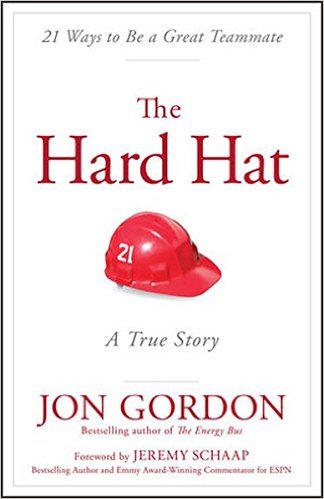
Entrepreneurship is not an individual event despite the fact that it is often portrayed as the modern version of the American cowboy where stoic independence reigns supreme. As it turns out the culture of the cowboy and the entrepreneur is decidedly team oriented. Teams are at the heart of successful organizations and especially those who are able to sustain high levels of performance – business, education, community, family, faith, and yes athletics. Underpinning the most effective teams is a spirit of deep commitment to personal excellence by each and every member. What defines the ultimate impact of a commitment to personal excellence is whether or not the individuals comprising a team use the energy created by the pursuit of exceptional performance selfishly or in service to others. .
I recently finished the most powerful book I have ever read about teamwork – The Hard Hat by Jon Gordon. The story lead me to reflect on the attributes of great teammates across all kinds of situations and circumstances. My assessment of the great teams with whom I have been associated directly or have studied from afar is that they share a set of common philosophical themes and behaviors:
- “Leave it better than you found it” is a philosophy that drives team oriented behavior. High performance team members claim ownership and take action to lead and generate outcomes that improve the organization. When ownership drives decision making then people take the extra steps and take on work that is behind the scenes, often unrecognized and usually unglamorous.
- An attitude of humility coupled with a hunger for excellence is a force multiplier and allows teams of lesser individual talent to dominate their more talented but arrogant competitors.
- Holding others accountable is impossible without personal accountability. Great teams are comprised of people who hold themselves to high standards of performance and who refuse to play the blame game, to make excuses, or to take a short-sighted approach. At the same time they hold each other to high expectations because a high level of trust is in place.
- Communication, connections, and compassion are ever present.
- The one percent rule is deeply ingrained (work to get 1 percent better in critical areas each and every day). It is the unrelenting dedication to this principle that moves human beings and teams towards their true potential.
- They do more than attract talent – they attract the right talent – people who are truly aligned with the core values, mission and culture of the team.
- Each member of the team strives to grow their skills, competitiveness, and to serve their teammates in pursuit of a common goal.
- They never shy from the opportunity to take action in pursuit of creating impactful relationships. More often than not; their behavior originates from a desire to see the team succeed.
The success of the Engler enterprise rests on one fundamental question that must be answered by each and every Engler Entrepreneur – what kind of teammate are you and what steps will you take to earn the confidence and trust of your team?